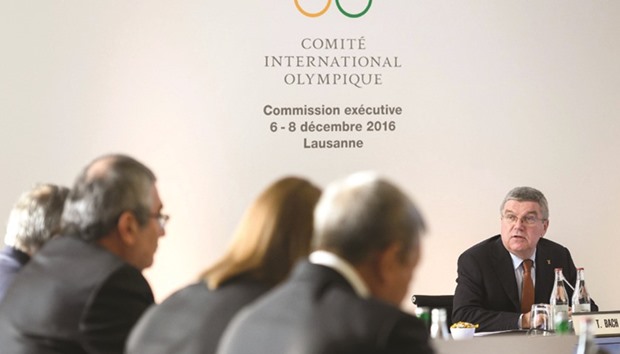Revelations from McLaren report on Russia’s doping schemes expected today
Russian sport is bracing for more pain after a bruising year that has seen some of its athletes turfed out of the Olympics over revelations of state-run doping.
Further revelations are expected today when the final report commissioned by the World Anti-Doping Agency (WADA) on Russian doping is released.
The International Olympic Committee on Wednesday extended sanctions imposed on Russia after the first part of the Richard McLaren report was released in July.
Canadian lawyer Richard McLaren detailed an elaborate scheme to manipulate drug tests at the 2014 Sochi Winter Olympics involving the sports ministry and the FSB security service.
Russia’s athletics federation was suspended by the IAAF in November 2015 after a bombshell WADA report accused the country of state-sponsored doping.
The banned national track and field team did not take part in the Rio Olympics, while the McLaren report led to a ban on the country’s entire Paralympic squad, sanctions that were extended indefinitely Wednesday.
But Russian authorities claim they are doing all they can to reform — strengthening doping checks and clamping down on cheating.
“Every cloud has a silver lining,” President Vladimir Putin said in his annual state of the nation address this month.
“I am convinced the so-called doping scandal will help us to create the most advanced system to fight this evil.”
But critics insist that the Kremlin is in denial over government involvement and, until that basic hurdle is cleared, nothing will really change.
“There are ongoing statements that there is no state involvement, there are threats to put anybody who reports otherwise in jail,” WADA founder Dick Pound, who led an earlier investigation into doping in Russian athletics, told AFP.
“It’s not a good sign.”
Kremlin spokesman Dmitry Peskov said that Russia was “ready to receive detailed information” in the new report due today, insisting that so far all accusations have lacked specifics.
Tainted faces
In the wake of the McLaren revelations in July some Russian officials were dismissed and lawmakers passed new legislation making it a crime to force athletes to use performance-enhancing drugs.
More often, however, those in charge have circled the wagons — presenting the doping allegations as part of a broader attack by the West against Russia.
Scandal-mired Vitaly Mutko, barred from the Olympics as part of the sanctions, was shifted from his post as sports minister to a more senior position as deputy prime minister that still gives him control over the field.
Pound called the move a “reward” — designed to take Mutko out of the limelight.
The new sports minister, former fencer Pavel Kolobkov, said at a Russian Olympic Committee meeting yesterday that the country had “declared war” against doping.
A new national anti-doping committee was set up this summer and 81-year-old veteran sports official Vitaly Smirnov placed in charge.
But the same tainted faces that have dominated Russian sports before sit on the body, seen by some as toothless and intended to sugar coat the problem.
The most pressing task for Russia is to try get its track and field athletes competing again in international tournaments while regaining membership of the athletics governing body, the IAAF.
Mutko has said he hoped that Russia’s track and field athletes will be allowed to compete internationally by the spring, but the IAAF Council this month voted to uphold the suspension while conceding the country had made progress since the summer.
Putin — who had blasted the exclusion of Russia’s track and field team as “beyond the legal sphere and common sense” — said earlier this month that he expected the country to implement a new anti-doping system by early 2017.
In addition to the law that punishes coaches and medical staff for forcing athletes to dope, lawmakers say they are planning additional legislation that would punish drug cheats.
One of the parliamentarians who drafted the law, Dmitry Svishchev, maintained that the Russian government could not have endorsed the use of performance-enhancing drugs.
“The government could not have supported illegal actions,” he told AFP. “The government follows the laws that it makes.”
The findings that will be revealed today “unfortunately are based on speculation of some individuals,” he said.
“There is no state program, no secret laboratory, no deal with the special services, especially not with the FSB,” he added.
“This is a classic information attack on Russia through sport.”

International Olympic Committee (IOC) president Thomas Bach (right) speaks at the opening of an executive meeting in Lausanne yesterday. (AFP)
